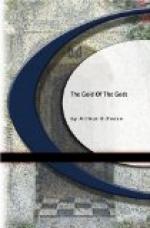As he handed her in she turned with a little shiver.
“Don’t please, think me foolish,” she added, with bated breath, “but often I fear that it is, as we call it, the mal de ojo—the evil eye!”
XIII
THE POISONED CIGARETTE
There was not a grain of superstition in Kennedy, yet I could see that he was pondering deeply what Inez Mendoza had just said. Was it possible that there might be something in it—not objectively, but subjectively? Might that very fear which the Senorita had of the Senora engender a feeling that would produce the very result that she feared? I knew that there were strange things that modern psychology was discovering. Could there be some scientific explanation of the evil eye?
Kennedy turned and went back into the hotel, to keep his appointment with Whitney, and as he did so I reflected that, whatever credence might be given the evil-eye theory, there was something now before us that was a fact—the physical condition which Inez had observed in her father before his death, saw now in Whitney, and foresaw in Lockwood. Surely that in itself constituted enough of a problem.
We found Whitney in the cafe, sitting alone in a leather-cushioned booth, and smoking furiously. I observed him narrowly. His eyes had even more than before that peculiar, staring look. By the manner in which his veins stood out I could see that his heart action must be very rapid.
“Well,” he remarked, as we seated ourselves, “how did you come out in your tete-a-tete?”
“About as I expected,” answered Kennedy nonchalantly. “I let it go on merely because I wanted Senorita Mendoza to hear certain things, and I thought that the Senora could tell them best. One of them related to the history of that dagger.”
I thought Whitney’s eyes would pop out of his head. “What about it?” he asked.
“Well,” replied Kennedy briefly, “there was the story of how her brother had it and was driven crazy until he gave it up to somebody, then committed suicide by throwing himself into Titicaca. The other was the tradition that in the days after Pizarro a Mendoza was murdered by it, just as her father has now been murdered.”
Whitney was listening intently, and seemed to be thinking deeply of something.
“Do you know,” he said finally, with a nod to indicate that he knew what it was that Kennedy referred to, “I’ve been thinking of that de Moche woman a good deal since I left you with her. I’ve had some dealings with her.”
He looked at Kennedy shrewdly, as though he would have liked to ask whether she had said anything about him, but did not because he knew Kennedy would not tell. He was trying to figure out some other way of finding out.
“Sometimes I think she is trying to double-cross me,” he said, at length. “I know that when she talks to others about me she says many things that aren’t so. Yet when she is with me everything is fine, and she is ready soon to join us, use her influence with influential Peruvians; in fact, there isn’t anything she won’t do--manana, to-morrow.”




